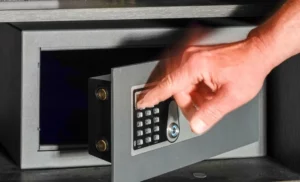Hotel communities are usually considered one of the safest locations to stay at night, whether you’re traveling for pleasure or going away on work for a few days. Larger hotel companies usually offer 24-hour concierge services in addition to 24-hour surveillance. This has a big impact on how secure you feel throughout your trip.
The majority of hotels like to add hotel room safes as additional security measures for their visitors. Safes enhance any existing basic security measures in many ways by giving hotel visitors another method to store their belongings safely and out of sight.
You might be possibly thinking that a hotel safe is the best place for keeping valuable items such as cameras, passports, credit cards, laptops, and more. But most people are unaware of how simple it might be to break into hotel safes. We’ll go over some reasons why we must avoid using hotel safes in this article-
Before we understand these reasons, let’s learn more about hotel safes and the level of security provided by them-
- External Access
- Obvious Location
- Older Materials
- Easy To Breach
Let’s first address some basic questions and learn more about hotel safes and the amount of protection offered by them before digging deeper into these reasons-
The purpose of this article is to highlight the problems with hotel room safes and provide you with as much knowledge as you can before stashing your priceless belongings. Remember to inquire about the room safe at the front desk the next time you visit a hotel. The supportive hotel staff should be able to offer some advice and take care of your security requirements.
- External Access
People frequently travel with pricey products that demand higher security. You might assume that a hotel room safe provides a convenient way to lock away your belongings right in front of you. While hotel safes offer some security, you cannot expect to have any assurance that your belongings will be safe.
External access is a simple idea. The chances that someone may interfere with your valuables increase as more people have access to something. And in this situation, you want as few individuals as possible to have access to a hotel room safe because you’re locking away essential items. As hotel safes are officially the hotel’s property therefore things can get difficult. The safes are not owned by the guests, and therefore they are not in charge of who gets access to them. According to the hotel, they require someone with complete access to all of the safes for the following reasons-
Someone forgets their password.
After checking out, a guest unintentionally leaves something inside the safe.
The safe needs maintenance because it isn’t working properly.
Because it is a liability issue when visitors store extremely valuable items in hotel safes, hotel chains need to be prepared for any of those scenarios. To supply their customers with high-quality services, they must help when issues arise.
- Outdated Materials
As already mentioned at the beginning of this post, hotel safes are mostly electrical and have a combination reset feature. As a general security measure, electronic locks can be very effective. However, one essential element ‘technology advancements’ is the foundation for the success of electrically powered devices.
The technology in your car, smartphone, or home appliances is the same as that in hotel safes. They are always evolving, and the newest model has more features than the previous or current model. Electronic locks and safes are no exception to the ongoing technological advancements.
The cost of technological advancement is a huge barrier for hotels. The average upper-scale hotel chain in the USA has 313.1 rooms, according to data from 2020. As a result, installing a safe in every room and upgrading them all when newer electronic safe models hit the market would be very costly.
From one year to the next, technological breakthroughs in security can occur occasionally. Hotel businesses don’t benefit financially by continually replacing large-scale safe inventory and paying for the installation labor hours related to that process.
The next time you stay at a hotel, you can put this theory to the test by peeking inside the safe. Does the technology appear to be current? How comfortable are you with putting personal belongings inside, depending on your response? You should continue cautiously and give up utilizing the safe in your hotel room if you have the slightest bit of doubt when answering these questions.
Poor safe maintenance is another issue that could cause serious security concerns. Hotels frequently overlook the need to maintain their safes in top shape and perform routine maintenance. The possibility that your products may be exposed can be greatly reduced by practicing proper care and maintenance because situations like this usually result in malfunctions.
- Easy To Breach
The fact that hotel room safes are so simple to break into may be the main deterrent to using them. If you know what you’re doing, it doesn’t take much to bypass an automated hotel safe. You can use a few simple methods to unlock a hotel safe without the combination. Please be aware that this material is only being provided for educational purposes before we continue reading this part. No information provided justifies breaching the law or using this as a guide to take other people’s property without their consent in any way. That would be unlawful, and we do not support it.
The fact that certain safes and locks require keys is one of their major flaws. If your lock is keyed, a burglar will always have a way through which they can attack and damage it. However, if there is no key for an electronic safe or lock, a thief must choose an unusual access point. This strategy is known as safe bouncing. Although it could take some getting used to, this technique just calls for a small movement. To start, you pick up the safe and hold it in front of a surface. After that, you turn the lock while also bouncing the safe off the ground. If done correctly, the bolt-work on the safe will be shocked into becoming unlocked.
Electronic safes can also be unintentionally breached using everyday objects. Some mass-produced safes that are found in hotel rooms can be accessed using standard tools. Money is the easiest solution to this problem. Several safe-making companies haven’t updated their locking systems in several years because they don’t have to. Hotels, businesses, and consumers continue to pay for electronic safes regardless of the situation, thus these big companies aren’t incentivized to make a change.
- Obvious Location
Being unpredictable and keeping assets in a location where the chances of someone finding them are greatly decreased can sometimes provide the best security for personal belongings. Criminals and burglars depend on common behaviors among people, including safe-hiding locations, for committing their crimes.
Criminals search for safes in locations that are hidden from notice by the general public but are still conveniently accessible to locals. For a home safe, the master bedroom, together with the master bathroom and the bedroom’s closets, would be the primary target. Unfortunately, hotel rooms are too small, and safes are usually located in the same spot.
Hotel room safes are usually kept in the closet or next to the microwave under the television. Due to the compact layout of hotel rooms, there aren’t many different places to hide a safe. This non-discrete safe place is too obvious and automatically reduces the element of surprise and overall security of your personal belongings.
Closing Words
We’ve all had to endure staying in hotels as an essential part of travel. Your room likely contains a customized safe that is a suitable location to store your valuables, depending on the hotel. This, however, may be a false sense of security as now you know about the potential drawbacks of hotel safes.
There isn’t a perfect safe that will completely protect your belongings, but you can reduce your risk by making wise decisions. When it comes to locking away your belongings, hotel safes are a dangerous venture, so you should definitely look into other solutions.
Best locksmith services in Corvallis
It is unsafe to store valuables in hotel safes because of a number of reasons. These include the fact that anyone with access can view the contents of these safes, and there is no way to tell whether they have been tampered with. Call Locksmith Empire in Corvallis right once to make an appointment if you require a locksmith. We provide free estimates and can typically arrive at your site right away. We are convinced that we have the resources that are required to help you with any type of safe locksmith service because of our more than 15 years of experience and great track record for customer service. Contact us right now. We are available 24/7 to help you. You simply have to give us a call and one of our professionals will be there at your location to help you.
FAQs
What kind of safes do hotels use?
The most common type of safe used in hotel rooms is an electronic safe. Due to the requirement that hotel safes have programming capabilities, this type is widely used. As a result, the combination must constantly be reset in order for each new visitor to the room to utilize the safe. For hotel visitors, being able to change the combination is practical and can provide them a sense of security knowing their belongings are hidden and safe. However, as we’ll discuss further in this post, it poses a number of difficulties. The perceived level of protection offered by hotel safes is far higher than the actual level of security offered.
Do all hotel rooms have safes?
There are some hotel rooms that do not have a safe. Even if staying at a renowned or luxurious hotel doesn’t guarantee a hotel room is safe, the chances are significantly better. And if there is a safe in the hotel room, it’s probably going to be an electronic one. The revolving door of visitors in that particular room reprograms a very generic, ordinary electronic safe several times each week. The potential security risks start there and don’t end there, for sure.
How much can you fit into a hotel safe?
An average hotel room safe has a volume between 1.2 and 2 cubic feet. You can fit your laptop, larger electronic devices, and other medium-sized objects in that space. Jewelry, tablets, cameras, and other personal items fall under this category.
Who has access to hotel room safes?
Visitors to hotels sometimes fail to ask this important question. You’re not the only one having access to your hotel room safe just because you preprogrammed a fresh combination for it. Every safe in the hotel has an access code that is known to someone else as a liability safeguard and general troubleshooting measure. The article explains why hotel safes aren’t as secure as people may think and will make this a key focus point soon. While having access to your assets and personal belongings in a hotel safe may seem private, hotel staff members who are not guests can always gain access.
Can hotel safes be trusted?
After taking everything into account, it makes no sense to place all of your trust in a hotel safe. It will become more obvious once you are aware of the drawbacks of using hotel room safes. It’s also important to keep in mind that the aim of this article is not to portray hotel managers and staff as possible thieves or con artists.
Is there a master code for hotel safes?
When the safes are installed, the majority of hotels will establish their own master codes; however, unhappily, some don’t bother, forget, or are uninformed that they must do that, so they continue to use the default codes, which are often relatively simple things like 9999, 000000, or 1111 and these can be very easy to guess.


